How to Conduct a Basic Background Check
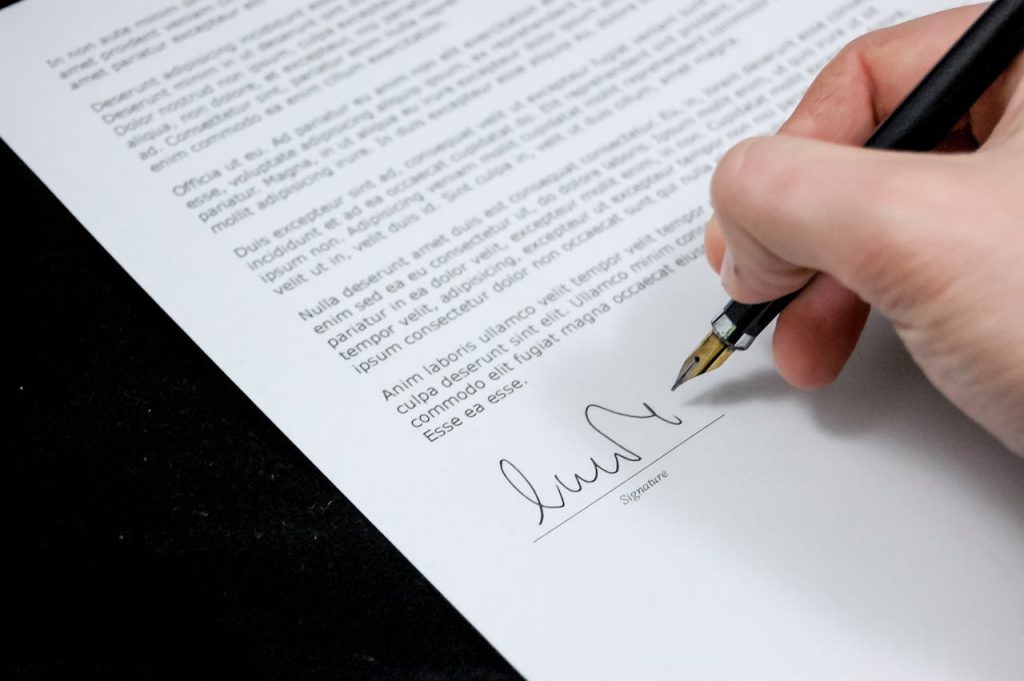
Understanding a Basic Background Check and Its Importance
In an era where security, trust, and credibility are paramount, conducting thorough background checks has become a critical part of many decision-making processes. Whether you are an employer hiring new staff, a landlord screening tenants, or an individual evaluating someone for a significant role in your life, a basic background check is an essential tool for gathering reliable, factual information. It helps verify the accuracy of claims and highlights potential risks that may not be immediately apparent.
What is a Basic Background Check?
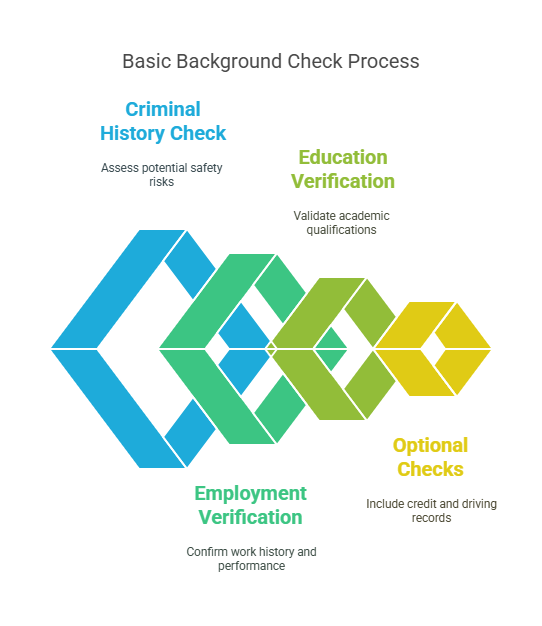
A basic background check is a process that involves investigating an individual’s personal history in several key areas. Typically, this type of check is the first step in screening a candidate or tenant. It is less comprehensive than a full-scale background check but provides critical information to help identify red flags.
The scope of a basic background check can vary depending on the purpose and the context. However, some of the most common elements included in a basic background check are:
- Criminal History: This is one of the most vital components of a basic background check. A criminal background check typically involves searching national, state, or local databases for criminal records. These records include convictions, charges, arrests, and warrants. Employers, landlords, and other decision-makers rely on this information to assess whether an individual poses a risk to safety or security.
- Employment History: Verifying a candidate’s work history is crucial in ensuring that they have the qualifications and experience they claim to possess. Employment verification checks typically involve contacting previous employers to confirm job titles, dates of employment, and job performance. This helps identify discrepancies in resumes or applications.
- Education Verification: This part of the background check ensures that an individual has the academic qualifications they report. Educational verification typically includes confirming the degree earned, the institution attended, and the dates of attendance. It is especially important in fields where specific qualifications are required for employment.
- Credit Report (Optional): In certain roles, especially those that involve financial responsibilities, employers may opt to perform a credit report check. This can provide insights into how an individual manages their finances. Credit checks often focus on an individual’s payment history, current debts, bankruptcies, and credit score.
- Driving Records: For roles that require employees to drive company vehicles or travel frequently, a driving record check can provide valuable information about an applicant’s driving history. This includes any traffic violations, license suspensions, or accidents. Employers use this information to assess whether the individual is a safe and responsible driver.
These core elements are the foundation of a basic background check. Depending on the situation, additional checks such as social media reviews, professional license verifications, or drug testing may also be incorporated. However, the primary focus remains on the criminal history, employment verification, and education details.
Why is a Basic Background Check Important?
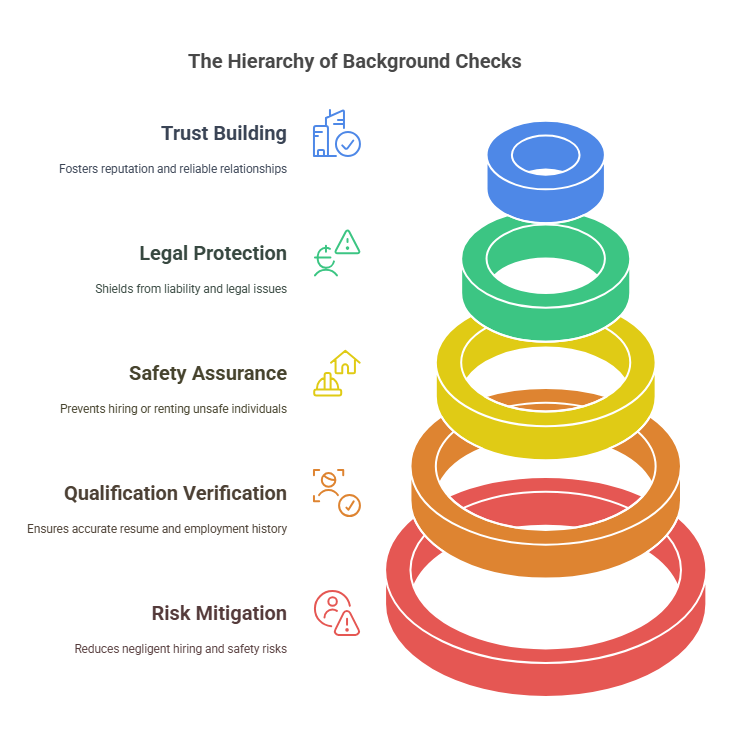
Background checks serve as an essential safeguard for organizations, landlords, and individuals alike. The process of gathering and verifying data helps mitigate risks, protect assets, and ensure safety. Below are some of the critical reasons why conducting a basic background check is vital:
1. Mitigating Risks for Employers
For employers, one of the most significant risks is negligent hiring. Negligent hiring occurs when an employer fails to conduct proper background checks and subsequently hires someone who may harm others or damage the organization. For example, hiring an individual with a history of violent behavior for a customer-facing role or hiring someone who has falsified qualifications could have serious consequences for both the company and its employees.
A basic background check helps minimize this risk by ensuring that the individual meets the necessary criteria for the job and does not have a history of behavior that could be harmful to the workplace. Employers in industries like healthcare, education, and finance are especially reliant on background checks due to the sensitive nature of their work.
2. Verifying Qualifications and Trustworthiness
Many candidates embellish their resumes, which can lead to hiring mistakes and problems down the line. A basic background check provides an objective way to verify an applicant’s qualifications. For example, education verification ensures that the degree they claim to have earned is legitimate, and employment verification ensures that the roles they list match their actual work history. Verifying these details helps employers make more informed decisions and ensures that they are hiring individuals who meet the required standards.
Additionally, landlords often perform background checks to verify that tenants are trustworthy and have a reliable rental history. It helps prevent renting to individuals with a history of late payments or property damage, reducing the risk of potential financial loss or legal conflicts.
3. Ensuring Safety for All Parties Involved
Safety is one of the most compelling reasons for conducting background checks. Whether you are hiring employees, renting property, or entering into a business agreement, safety is always a priority. A criminal background check ensures that an individual does not have a history of violent crimes, theft, fraud, or other offenses that could jeopardize the safety of employees, tenants, or customers.
For example, an employer hiring a truck driver might conduct a driving record check to verify that the applicant has a clean driving history, reducing the risk of accidents or damage to company property. Similarly, landlords can prevent renting to individuals with violent offenses that could potentially create unsafe living conditions for others.
4. Avoiding Legal and Financial Liabilities
Negligent hiring or renting practices can expose employers and landlords to serious legal and financial consequences. If an individual is hired without conducting a background check and subsequently causes harm, the employer could be held liable for negligence. For example, if an employee with a history of workplace violence injures another employee, the employer could face lawsuits for not performing a proper background check.
In the case of landlords, renting to a tenant without verifying their background could result in damage to the property, missed rent payments, or even eviction proceedings, all of which can lead to financial loss and legal challenges. Performing background checks helps ensure compliance with industry regulations and protects both employers and landlords from such risks.
5. Building Trust and Credibility
A solid reputation is built on trust, and conducting background checks plays a key role in fostering that trust. When employers conduct background checks, they show that they are committed to hiring qualified individuals and maintaining a safe work environment. This is particularly important for industries that involve handling sensitive data or public interactions, such as healthcare or finance.
Similarly, landlords who perform background checks demonstrate that they are committed to providing a safe and reliable living environment. For individuals, performing a background check on a potential business partner or tenant shows that you are thorough, responsible, and prioritize security.
Relevant Statistics Highlighting the Value of Basic Background Checks
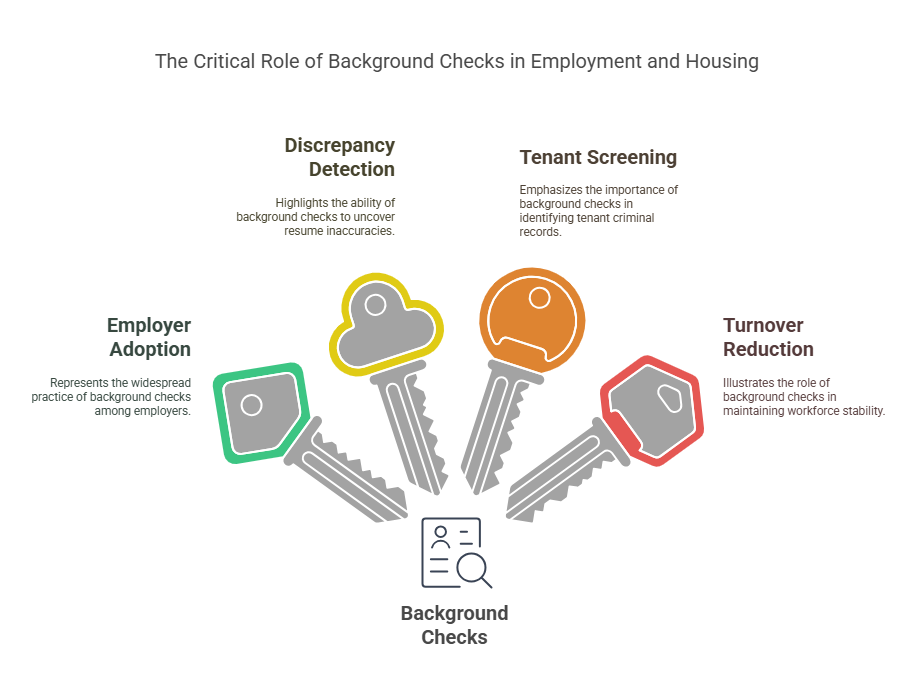
There is substantial evidence that supports the value of conducting basic background checks:
- The National Association of Professional Background Screeners (NAPBS) reports that nearly 96% of employers conduct background checks during the hiring process.
- The Society for Human Resource Management (SHRM) found that 39% of employers have discovered discrepancies or lies on applicants’ resumes through background checks.
- According to a TransUnion study, 1 in 3 U.S. tenants has a criminal record, highlighting the importance of background checks in rental situations.
- Research by ADP shows that 82% of employers consider background checks a necessary part of their hiring process, with 83% reporting that background checks help reduce turnover.
These statistics underline the importance of performing background checks, not just for verifying qualifications but also for reducing risk, ensuring safety, and building trust.
Step-by-Step Process of Performing a Basic Background Check
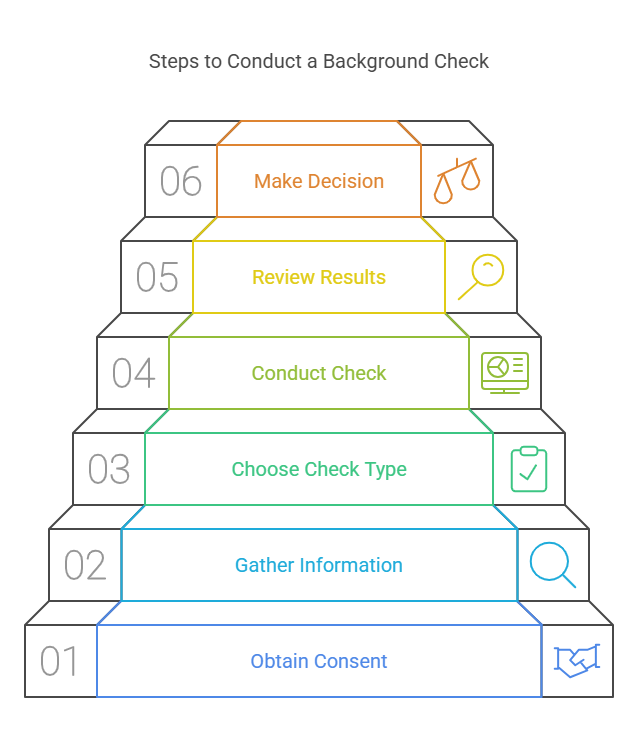
Whether you are an employer hiring a new employee, a landlord screening potential tenants, or an individual seeking to verify someone’s qualifications or past history, conducting a background check follows a systematic approach. While each situation may require a different set of checks, the general process involves the following key steps:
1. Obtain the Necessary Consent
Before you can conduct a background check, it is essential to obtain the necessary consent from the individual being checked. Under the Fair Credit Reporting Act (FCRA), obtaining written consent is a legal requirement, especially if you are conducting a check for employment purposes. The individual should be informed about the nature of the background check and should provide explicit permission before you proceed.
For employers, this means providing candidates with a consent form before initiating the background check. Similarly, landlords must obtain consent from prospective tenants before performing a rental history or criminal background check.
Without proper consent, you risk violating privacy laws and could face legal consequences. It’s also important to ensure that the information collected is used solely for its intended purpose, in compliance with applicable regulations.
2. Gather the Required Information
Once consent is obtained, the next step is to collect the necessary details to perform the background check. For a basic background check, the following information is typically required:
- Full Name: Ensure the person’s full legal name is obtained, including any aliases they may have used in the past.
- Date of Birth: This is crucial for distinguishing between individuals with similar names and ensuring the background check is accurate.
- Social Security Number (SSN): While not always required, an SSN can significantly improve the accuracy of the background check by matching it to the correct records, particularly when searching for criminal history or credit reports.
- Address History: If you are conducting a criminal background check, knowing the person’s address history can help locate the relevant jurisdictions and criminal records tied to specific locations.
- Previous Employers or Educational Institutions: To verify employment history or educational background, you will need to gather the names of past employers or schools attended, along with the dates of employment or attendance.
It is important to ensure that the information you gather is complete and accurate to avoid delays or incomplete checks. Any missing or inaccurate data can slow down the process and lead to incomplete results.
3. Choose the Type of Background Check to Conduct
Once you have the necessary information, you can decide on the type of background checks you want to perform. There are several options, and the type of check you choose will depend on the reason for conducting the background check and the level of verification required.
Here are the most common types of background checks included in a basic background check:
- Criminal Background Check: This is one of the most important parts of any background check. It involves searching criminal records to identify any history of arrests, convictions, or warrants. Depending on the jurisdiction, criminal checks can be performed at the federal, state, or county level. Employers often use this check to assess potential risks to workplace safety.
- Employment Verification: Employers typically want to confirm that candidates have the work history they claim. This involves contacting previous employers to verify the job title, dates of employment, and performance. This process ensures that applicants have the necessary experience and qualifications for the job.
- Education Verification: This check ensures that applicants have earned the degrees or certifications they list on their resumes. It involves contacting schools or universities to verify attendance dates and degrees awarded. Education verification is particularly important for jobs requiring specific academic qualifications.
- Driving Records: For positions where driving is a core responsibility, verifying the applicant’s driving history is essential. This check helps employers ensure the applicant has a clean driving record, free from violations, suspensions, or accidents.
- Credit Reports (optional): A credit check is often used when hiring for positions that involve financial responsibilities. It provides insights into an individual’s financial habits, including credit card usage, loan history, and bankruptcies. It’s particularly important for positions in finance or accounting.
4. Conduct the Background Check
After gathering the required information and determining which checks to perform, the next step is to actually run the background check. You can either handle this process yourself or use a professional service to ensure accuracy and efficiency.
Performing a Background Check on Your Own
While it is possible to run a background check on your own, it can be time-consuming, complicated, and prone to error. Many databases and records are not centralized, which means you may need to search multiple sources (state databases, county courthouses, and educational institutions) to gather all the relevant information. Additionally, public records may not always be up to date or complete, leading to potential gaps in the information you obtain.
Using a Third-Party Background Check Service
The easiest and most reliable way to perform a background check is by using a professional background check service. These services have access to comprehensive databases and the necessary tools to conduct thorough and efficient checks. Some background check services even specialize in certain areas, such as criminal history checks, credit reports, or employment verifications.
By using a service like Exact Background Checks, businesses and individuals can simplify the process. Exact Background Checks offers a streamlined, secure, and accurate platform for performing background checks, providing fast turnaround times and ensuring compliance with relevant laws.
5. Review the Results
Once the background check is complete, you will receive a report that contains all the information obtained. The results will typically include a detailed summary of the individual’s criminal history, employment verification, education details, and any other relevant findings. Here’s how to interpret the results:
- Criminal History: Look for any convictions or charges, especially for serious offenses such as felonies or violent crimes. Check the dates to determine if the offenses are recent or in the past, as well as whether the individual has been rehabilitated.
- Employment History: Verify the dates and job titles to ensure they match what the candidate has listed on their resume. Pay attention to any gaps in employment that may need further clarification.
- Education: Confirm that the educational institutions listed are legitimate and that the individual has the qualifications they claim.
- Driving Record: Review any violations, accidents, or suspensions in the individual’s driving history to assess whether they are suitable for roles that require driving.
- Credit Report: If a credit report is included, look for any negative indicators such as late payments, high debt, or bankruptcies that may signal financial instability, especially for roles involving financial responsibilities.
6. Make an Informed Decision
The final step in the process is using the information from the background check to make an informed decision. Consider all the data in the context of the role or rental situation. For example:
- If an applicant has a minor criminal offense from years ago but a strong work history, the employer may decide to overlook the offense, depending on the nature of the job.
- If a tenant has a history of non-payment of rent, it may be wise to consider other applicants.
- If an applicant for a driving role has a DUI, the employer may decide it poses too great a risk.
It is essential to follow fair and non-discriminatory practices when making decisions based on background check results. For example, employers should not automatically reject candidates based on minor offenses from long ago, especially if the offense is not relevant to the role.
Advantages of Using a Professional Service like Exact Background Checks
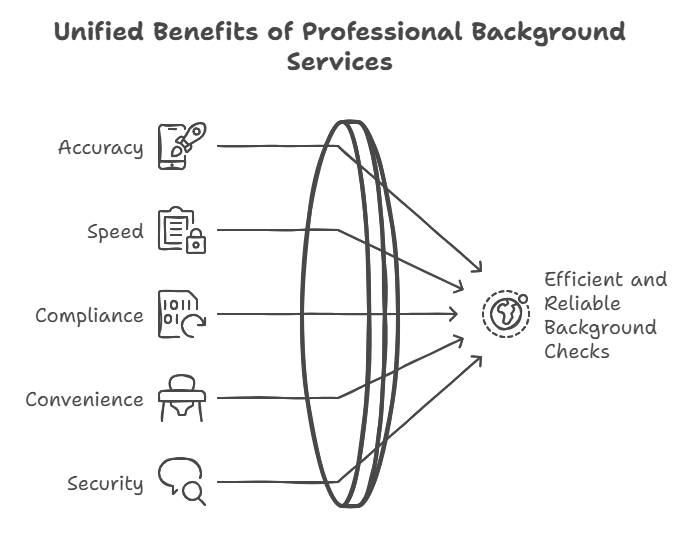
While performing a background check on your own is possible, using a professional service like Exact Background Checks provides several advantages:
- Accuracy: Professional services have access to up-to-date, accurate, and comprehensive data sources, reducing the risk of missing crucial information.
- Speed: A background check can take days or even weeks if done manually, whereas a service like Exact Background Checks can complete the process much faster, often within a few hours or days.
- Compliance: Exact Background Checks ensures that your background check is compliant with local, state, and federal laws, including the Fair Credit Reporting Act (FCRA).
- Convenience: Using a service removes the burden of managing the logistics of the check. You don’t need to visit courthouses, contact employers or educational institutions, or search multiple databases.
- Secure: Professional services use encrypted systems to protect sensitive personal information, ensuring confidentiality and privacy.
Legal Aspects of Performing a Basic Background Check
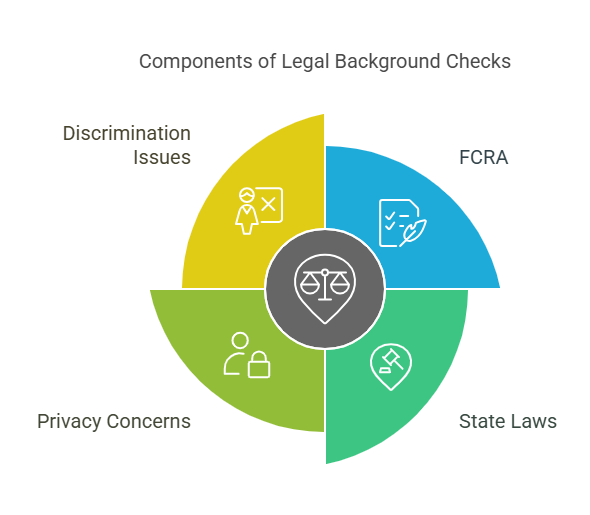
Conducting a basic background check involves several legal considerations. It is essential to understand the regulations governing the use of background checks to ensure compliance with the law. There are various laws and rules that apply to background checks, especially when they involve sensitive information such as criminal history, credit reports, and employment history.
1. Fair Credit Reporting Act (FCRA)
The Fair Credit Reporting Act (FCRA) is one of the most important regulations when it comes to background checks, especially for employers and landlords. The FCRA governs how background checks are conducted and establishes certain rights for individuals being checked.
Some key provisions of the FCRA include:
- Written Consent: Before conducting a background check, you must obtain written consent from the person being checked. This is a mandatory requirement for employers and landlords. If consent is not obtained, it is illegal to proceed with the background check.
- Notification Requirement: If an employer decides not to hire an individual based on the results of a background check, they must notify the applicant. The applicant must be provided with a copy of the background check report, along with a notice of their right to dispute the information.
- Accuracy of Information: The FCRA mandates that any information collected through a background check must be accurate and up to date. Employers and others who conduct background checks are responsible for ensuring the information is correct. If inaccurate or outdated data is used to make a decision, the individual has the right to dispute the information.
- Adverse Action: If an employer or landlord takes adverse action (e.g., not hiring someone or not renting to them) based on the background check, they are required to follow a process called adverse action notification. This includes providing the individual with a copy of the background check and information on how to dispute any errors.
2. State Laws and Regulations
In addition to the FCRA, each state may have its own laws and regulations governing background checks. These state laws can vary widely and can affect everything from the types of records that can be used to the information that employers or landlords can consider when making a decision.
For example:
- Ban the Box Laws: Many states and municipalities have implemented Ban the Box laws, which prohibit employers from asking about criminal history on initial job applications. Employers can only inquire about criminal history later in the hiring process, usually after an initial interview or a conditional job offer. This ensures that candidates are not unfairly discriminated against based on their criminal history before being evaluated for their skills and experience.
- Expungement: In some states, criminal records may be sealed or expunged after a certain period, meaning they cannot be considered during a background check. For example, a person with a criminal conviction in Texas may be able to have their record sealed after a specific waiting period, depending on the offense.
- Credit Reports: Several states have enacted laws limiting how credit reports can be used for employment purposes. In some states, employers cannot use credit checks to evaluate candidates for certain types of jobs, especially for positions that do not involve financial responsibilities.
- Fair Housing Laws: In the context of landlord-tenant relationships, Fair Housing Laws protect individuals from discrimination based on race, color, national origin, religion, sex, familial status, or disability. While landlords may conduct background checks on potential tenants, they must do so in a way that does not violate these laws.
3. Privacy Concerns and Protection of Information
Privacy is a major concern when conducting background checks. Personal information such as criminal history, employment history, and education records is sensitive, and mishandling it can result in significant legal consequences. To ensure compliance with privacy laws:
- Confidentiality: All background check information should be kept confidential and used solely for its intended purpose. Employers, landlords, and third-party background check services must take appropriate steps to safeguard the information.
- Data Security: Organizations should ensure they are using secure platforms for conducting background checks, especially when sensitive personal data such as Social Security numbers or credit reports are involved. Using services like Exact Background Checks can help ensure data security and compliance with privacy laws.
4. Discrimination and Fair Hiring Practices
When conducting a basic background check, it is important to avoid discriminatory practices. Employers and landlords should use the information obtained from background checks fairly and consistently. The Equal Employment Opportunity Commission (EEOC) provides guidance on how to use criminal records and other background information in a non-discriminatory way.
Some key considerations include:
- Relevance to the Role: Criminal convictions should only be considered if they are directly relevant to the job or rental situation. For example, a history of theft may be relevant for a job involving cash handling but may not be as relevant for a different position.
- Fairness in Evaluation: Employers should evaluate the individual’s entire background, including the nature and timing of any offenses. An old conviction for a minor offense may not be as relevant as a more recent serious conviction.
FAQs About Basic Background Checks
To provide further clarity on the topic of basic background checks, here are some frequently asked questions (FAQs) that will help address common concerns.
What are the core elements typically included in a basic background check?
A basic background check commonly includes criminal history checks, employment verification, education verification, and optionally, credit reports and driving records.
Why is it important to conduct a basic background check?
Basic background checks help mitigate risks for employers, verify qualifications and trustworthiness, ensure safety for all parties involved, avoid legal and financial liabilities, and build trust and credibility.
What are the key steps involved in performing a basic background check?
The key steps are obtaining necessary consent, gathering required information, choosing the type of background check, conducting the check (either independently or through a service), reviewing the results, and making an informed decision.
What legal considerations must be adhered to when conducting a basic background check?
Legal considerations include compliance with the Fair Credit Reporting Act (FCRA), adherence to state laws and regulations (such as "ban-the-box" laws), protecting privacy concerns, and avoiding discriminatory practices.
What are the advantages of using a professional background check service like Exact Background Checks?
Advantages include accuracy, speed, compliance with legal standards, convenience, and secure handling of sensitive personal information.
What are the core elements typically included in a basic background check?
A basic background check commonly includes criminal history checks, employment verification, education verification, and optionally, credit reports and driving records.
Why is it important to conduct a basic background check?
Basic background checks help mitigate risks for employers, verify qualifications and trustworthiness, ensure safety for all parties involved, avoid legal and financial liabilities, and build trust and credibility.
What are the key steps involved in performing a basic background check?
The key steps are obtaining necessary consent, gathering required information, choosing the type of background check, conducting the check (either independently or through a service), reviewing the results, and making an informed decision.
What legal considerations must be adhered to when conducting a basic background check?
Legal considerations include compliance with the Fair Credit Reporting Act (FCRA), adherence to state laws and regulations (such as "ban-the-box" laws), protecting privacy concerns, and avoiding discriminatory practices.
What are the advantages of using a professional background check service like Exact Background Checks?
Advantages include accuracy, speed, compliance with legal standards, convenience, and secure handling of sensitive personal information.
Conclusion
In conclusion, conducting a basic background check is an essential step for employers, landlords, and individuals seeking to verify someone’s background. It helps mitigate risks, verify qualifications, and make informed decisions. However, it is crucial to follow legal requirements and maintain fair practices throughout the process.
By adhering to the Fair Credit Reporting Act (FCRA) and understanding the specific regulations in your state, you can ensure compliance and protect the rights of individuals being checked. Additionally, by using reliable services like Exact Background Checks, you can streamline the process, ensuring timely, accurate, and secure background checks that align with legal standards.
Remember, background checks are a valuable tool, but they must be used responsibly and ethically. Whether you’re hiring employees, screening tenants, or verifying someone’s history for other purposes, always ensure that the process is thorough, fair, and legally compliant.



